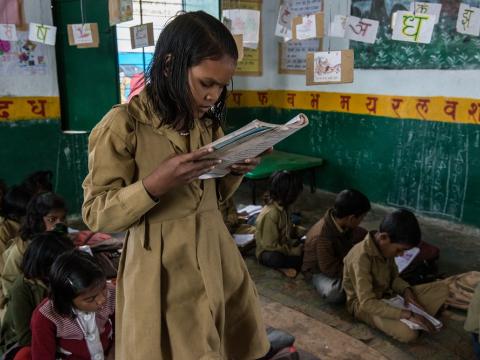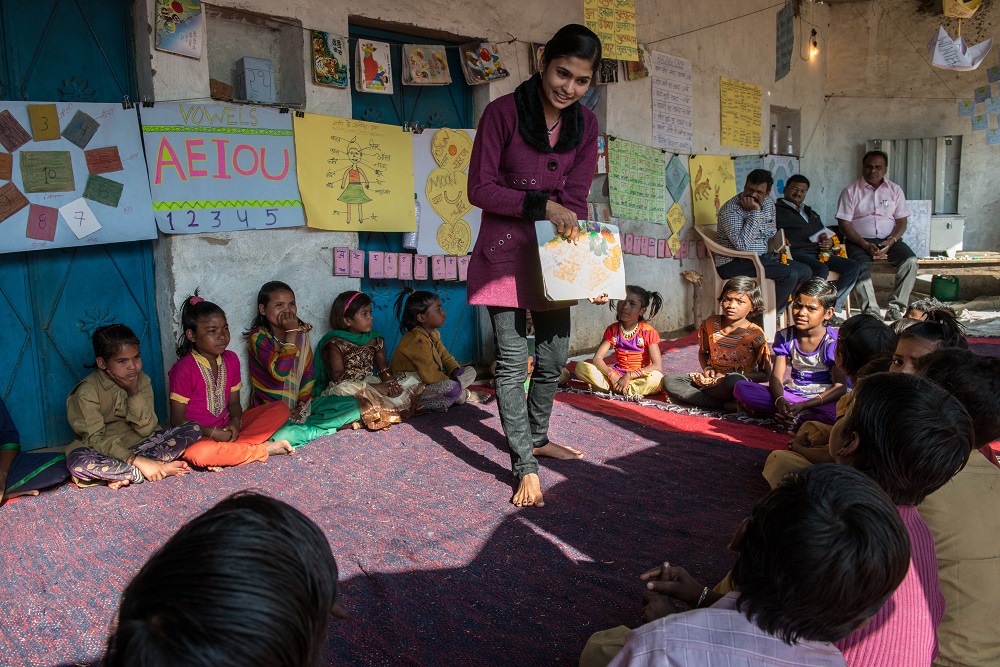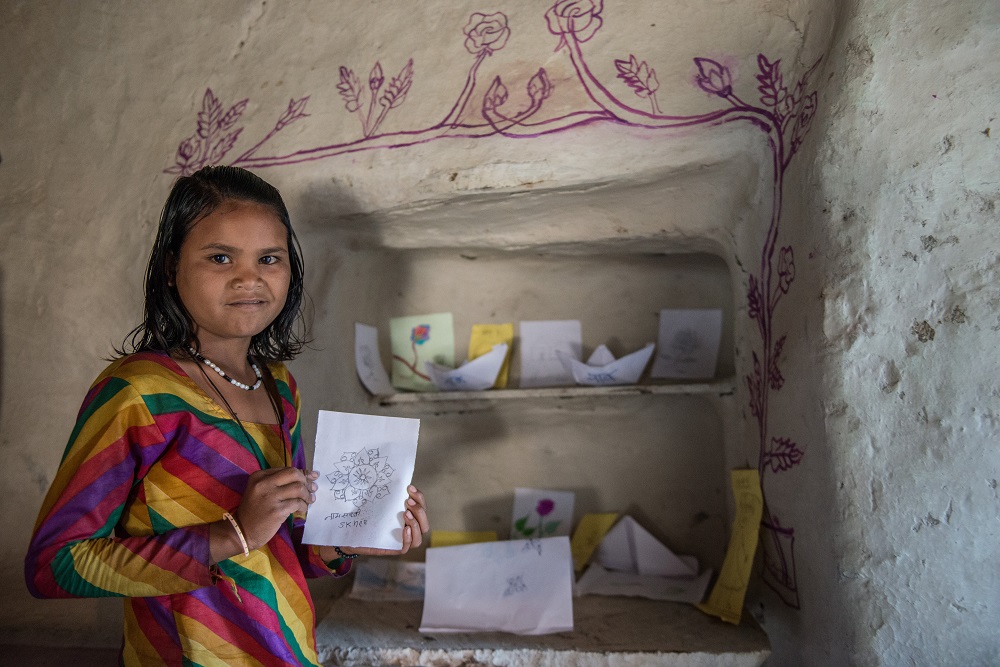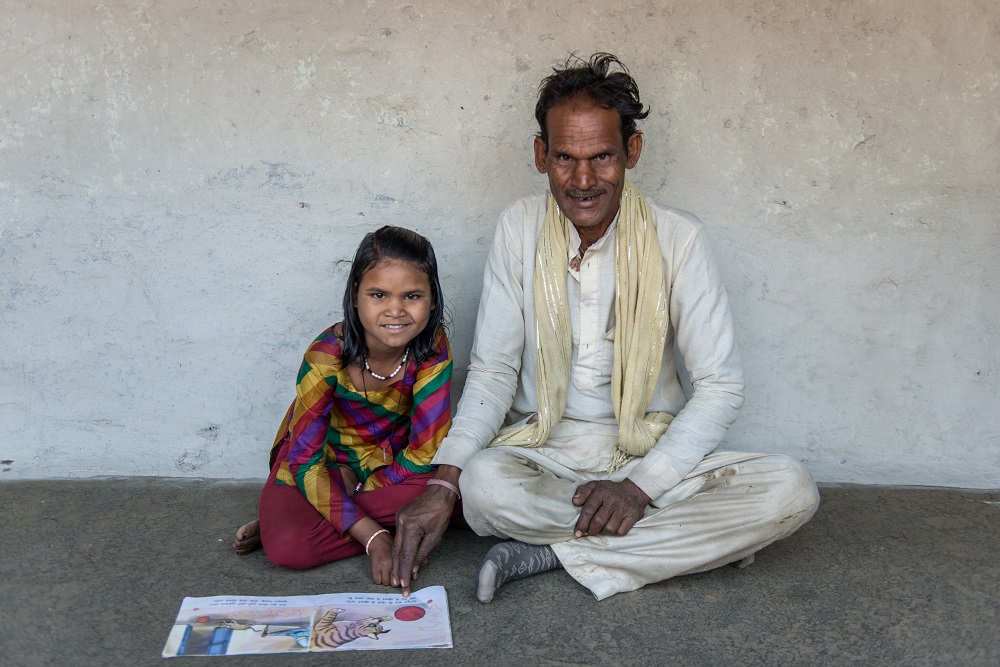Literacy Boost gets children back to school in India

“Sakhi has shown considerable progress in her reading skills since she joined the reading club,” says Pooja, the reading club facilitator at Semra village in Aparajita, India.
It’s a warm winter day. Children are sitting in a circle surrounded by a collection of colourful charts prepared by they themselves over the course of the reading club.
“We were taught to use various activities to make learning fun for children during the trainings conducted by World Vision,” says Pooja. “The results have been wonderful as children are more eager to learn now.”
Reading clubs (sometimes called reading camps) are an integral component of the Literacy Boost programme for early grade learners. Children attend the camps after school and on weekends to build on the literacy skills they learn at school. The clubs are facilitated by trained community volunteers, like Pooja, who lead the children through fun activities like songs, games and arts and crafts – all of which focus on building reading skills.
Nineteen-year-old reading club facilitator, Pooja, helps children learn to read through fun out-of-school activities. (Photo credit: Tiatemjen Jamir / World Vision)
“We were taught to use various activities to make learning fun for children during the trainings conducted by World Vision,” says Pooja. “The results have been wonderful as children are more eager to learn now.”
Apart from the teacher training and the development of age and culturally appropriate reading materials, World Vision also provides resources that are used by children for various activities in the reading clubs and schools.
“I like reading the most,” says 8-year-old, Sakhi. “I also like the make-and-take activity where we are asked to draw or write something from what we learned at the reading club that we take home and store in our reading corners.”
Sakhi shows the make-and-take crafts she's created at her reading camp, which she keeps in her reading corner at home. (Photo credit: Tiatemjen Jamir / World Vision)
“World Vision has taught us how to be involved in our child’s education even at home,” says Babu, Sakhi’s father. “When Sakhi returns from school we ask her about her day in school and everything she learnt to ensure she understands what is being taught.”
“I’ve also studied until the eighth grade so I help her read and study at home,” says Babu. “A few months ago Sakhi could barely even recognise alphabets. Today she is able to comfortably read full sentences from books.”
Sakhi and her father, Babu, 40, read outside their home. (Photo credit: Tiatemjen Jamir / World Vision)
“We have 132 students in this school,” says Bal Krishna, Sakhi’s teacher. “However, we have only 50 per cent attendance on average. Parents here don’t see the importance of sending their children to school.”
“A few months ago Sakhi could barely even recognise alphabets. Today she is able to comfortably read full sentences from books," says Sakhi's father.
According to Bal, Literacy Boost builds a child’s interest in learning to read and ensures that parents understand why regular school attendance is important through parental awareness sessions. Of the children who do attend school regularly 60 are part of the Literacy Boost programme and participate in reading clubs.
Teachers, like Bal, are also provided training as part of the Literacy Boost programme to use activities that makes learning interesting for children. (Photo credit: Tiatemjen Jamir / World Vision)
“Barely a few months ago Sakhi could neither read nor write,” says Bal. “She was shy and didn’t participate in class activities. However, due to the Literacy Boost programme, organised by World Vision, she is now able to read and actively participate in class.”
“There are days the reading club continues for over the usual two hour sessions,” says reading club facilitator, Pooja.
Pooja, the reading club facilitator agrees that Literacy Boost helps motivate children to learn to read. “There are days the reading club continues for over the usual two hour sessions,” she says. “Even then the children are happy to stay and continue learning. The various activities keep the children interested, which makes learning quick and easy.”
Today Sakhi and 1,450 other children across four communities take part in 66 reading clubs setup by World Vision India to pilot Literacy Boost. The numbers continue to grow as more and more children and parents are exposed to the joy and importance of education.
Quick facts: Literacy Boost pilot programme in India
- World Vision is piloting Literacy Boost in four communities in Uttar Pradesh and Jharkhand states.
- At the beginning of the programme a baseline evaluation found that only 2 per cent of Grade 2 students and 8 per cent of Grade 3 students surveyed could read with comprehension. In 2016, an endline assessment will be conducted to measure learning outcomes among students in the programme.
- In 2015, World Vision conducted 728 reading awareness workshops with about 2,500 parents and caregivers.
- In one community in Uttar Pradesh State, 285 previously out-of-school children were enrolled in school. Of the 285, 68 were enrolled for the very first time.
Related links:



